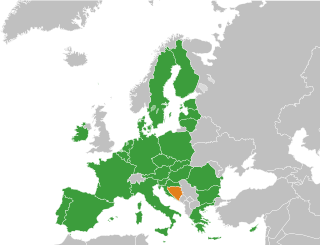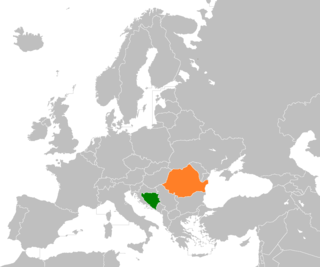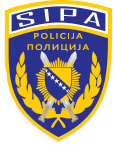Creation of the new police system
Since January 1, 2003, the European Union assigned the EUPM the role of creating the new stable police force for Bosnia and Herzegovina, in order to stabilise the region and remove some of the burden shouldered by the peace missions of the United Nations. Both the EUPM and the local government continue to work to create a police force as defined by the European Union.
The EUPM laid out three main objectives, to support the fight against organised crime, support police reforms and watch over police actions that are "unlawful, misconducts and contrary to the best practice or generally applied rules of engagement" [4] The first aim led to EUPM's funding for the Bosnian State Investigation and Protection Agency (SIPA), as well as developing the Ministry of Security (MoS) and the State Border Service (SBS). EUPM also works to coordinate between these organisations and both EUFOR and SFOR. [4] The EUPM also funds a number of public information campaigns, primarily targeted at reducing road deaths and drug use in the population. [5] As of May 11, 2007 EUPM have received a total of 168 police officers and civilian personnel from mainstream contributing nations, with France and Germany the leading contributors, and 19 from those that it refers to as "Third States", with Ukraine the leading contributor of these. [6]
In 2005 the Directorate for Police Restructuring was established in the country to aid with the reform of the police services, however new plans for the reforms were unveiled only in December 2006, with the political parties of Bosnia and Herzegovina being invited to discuss the plans on 16 February 2007. [7] Foreign minister Sven Alkalaj visited the United Kingdom in March 2007, where Geoff Hoon, Minister for Europe and Peter Ricketts, Permanent Under Secretary all urged Bosnia to strive for police reform, [7] further discussions took place in Bosnia on 11 April 2007 however little consensus has been reached. [7]
Criticism of the EUPM
Bosnian police statistics state that crime increased 22% in Republika Srpska (the Serbian entity of Bosnia) and 32% in the Bosniak/Croat Federation in 2004. [8] Thus, the EUPM has received much criticism from groups such as the International Crisis Group, and the Bosnian State Investigation and Protection Agency itself, whose director stated that "There are currently 15 police agencies operating in Bosnia. They are uncoordinated or can only co-ordinate voluntarily, which is no good for policy." [3] The EUPM's chief adviser to the SIPA also stated that "The criminals in this part of the world work to best European practice and standards. It is time the police do, too." [3]
A particular criticism is the over complication of the police system in Bosnia and Herzegovina. With the country strongly divided by the Dayton Agreement, there are several police districts operating in a country of only 50,000 km2. An EUPM spokesperson illustrated this when stating that "In Sarajevo if a crime is committed on the streets that are part of one of the entities, the Federation, and the criminal drives four, five kilometres outside the centre, he crosses the boundary line into Republika Srpska," [9] A British police officer working with EUPM also highlighted the dangers of a low-performing police force in Bosnia: "It's in a very vulnerable position geographically, in terms of drug producing countries, in terms of trafficking things like drugs and people that find their way into western Europe," [9]

The Armed Forces of Bosnia and Herzegovina is the official military force of Bosnia and Herzegovina. The BiH armed forces were officially unified in 2005 and are composed of two founding armies: the Bosniak Army of the Federation of Bosnia and Herzegovina (VFBiH) and the Bosnian Serbs' Army of Republika Srpska (VRS).
The European Union Police Mission in Bosnia and Herzegovina (EUPM) was the European Union's mission in Bosnia and Herzegovina that aided the local police organizations, and was one of a number of European Union Police Missions worldwide. It was the first such mission undertaken by the EU within the framework of the Common Foreign and Security Policy. The EUPM was the successor to the United Nations International Police Task Force in Bosnia, whose term ended at the end of 2002.

Republika Srpska is one of the two entities of Bosnia and Herzegovina, the other being the Federation of Bosnia and Herzegovina. It is located in the north and east of the country. Its largest city and administrative centre is Banja Luka, lying on the Vrbas river, and with a population of about 138,963 people.

The Bosnian War was an international armed conflict that took place in Bosnia and Herzegovina between 1992 and 1995. The war is commonly seen as having started on 6 April 1992, following a number of earlier violent incidents. The war ended on 14 December 1995 when the Dayton accords were signed. The main belligerents were the forces of the Republic of Bosnia and Herzegovina, the Republic of Herzeg-Bosnia, and the Republika Srpska, the latter two entities being proto-states led and supplied by Croatia and Serbia, respectively.

Operation Althea, formally the European Union Force Bosnia and Herzegovina (EUFOR), is a military deployment in Bosnia and Herzegovina to oversee the military implementation of the Dayton Agreement. It is the successor to NATO's SFOR and IFOR. The transition from SFOR to EUFOR was largely a change of name and commanders: 80% of the troops remained in place. It replaced SFOR on 2 December 2004.

The Republika Srpska was a self-proclaimed statelet in Southeastern Europe under the control of the Army of Republika Srpska during the Bosnian War. It claimed to be a sovereign state, though this claim was only partially recognized by the Bosnian government in the Geneva agreement, the United Nations, and FR Yugoslavia. For the first six months of its existence, it was known as the Serbian Republic of Bosnia and Herzegovina.

Milorad Dodik is a Bosnian Serb politician serving as the 8th president of Republika Srpska since 2022, having previously served from 2010 to 2018. He also served as the 7th Serb member of the Presidency of Bosnia and Herzegovina from 2018 to 2022.

On 25 May 1995, the Army of Republika Srpska (VRS) launched an artillery attack against the town of Tuzla, which left 71 dead and 240 wounded. The event is also known as the Tuzla massacre.

The accession of Bosnia and Herzegovina to the European Union (EU) is the stated aim of the present relations between the two entities. Bosnia and Herzegovina has been recognised by the European Union as a "candidate country" for accession since the decision of the European Council in 2022 and is on the current agenda for future enlargement of the EU. Bosnia and Herzegovina takes part in the Stabilisation and Association Process and trade relations are regulated by an Interim Agreement.
Bosnia and Herzegovina vehicle registration plates have held their current form since 2 February 1998. Currently the Bosnia and Herzegovina (BiH) vehicle registration plate format consists of seven characters: five numbers and two letters arranged in the following order: X00-X-000. The plates are uniform across the country and do not denote the place where the vehicle is registered, as was the case prior to 1998. Likewise the plates do not contain any heraldic symbols. The plates use only letters which are represented equally in Latin and Cyrillic script.

The mass media of Bosnia and Herzegovina refers to mass media outlets based in Bosnia and Herzegovina (BiH). Television, radio, magazines and newspapers are all operated by both state-owned and for-profit corporations which depend on advertising, subscription, and other sales-related revenues. The Constitution of Bosnia and Herzegovina guarantees freedom of speech, although political and business pressures - coupled with administrative fragmentation - still hinder the independence of journalists and media outlets.

Bosnia and Herzegovina–Romania relations are bilateral relations between Romania and Bosnia and Herzegovina. Both countries are full members of the Southeast European Cooperation Process, Southeast European Cooperative Initiative, Organization for Security and Co-operation in Europe, and Stability Pact for South Eastern Europe. Bosnia and Herzegovina has an embassy in Bucharest. Romania has an embassy in Sarajevo.

General elections were held in Bosnia and Herzegovina on 3 October 2010. They decided the makeup of Bosnia and Herzegovina's Presidency as well as national, entity, and cantonal governments.

The State Investigation and Protection Agency (SIPA) is the official state police agency of Bosnia and Herzegovina. SIPA is under the direct administration of the Ministry of Security of Bosnia and Herzegovina. Essentially, it is Bosnia and Herzegovina's equivalent to the American FBI or the Russian Investigative Committee.
The Bosnian mafia is the body of illegal gangs and criminal organisations operating in Bosnia and Herzegovina and within the Bosnian diaspora. Bosnian organised crime figures operate mostly in Europe. Bosnian organised-crime groups are involved in a wide range of activities and extortion. Smuggling revenues are between €600 million and €900 million.

In United Nations Security Council resolution 1396, adopted unanimously on 5 March 2002, after recalling resolutions 1031 (1995), 1088 (1996), 1112 (1997), 1256 (1999) and 1357 (2001) on the situation in Bosnia and Herzegovina, the Council welcomed the acceptance by the Steering Board of the Peace Implementation Council on 28 February 2002 of the offer of the European Union to provide a European Union Police Mission (EUPM) to succeed the United Nations Mission in Bosnia and Herzegovina (UNMIBH) from 1 January 2003.
The 2015 Zvornik police station shooting happened on April 27, 2015 when a gunman attacked a police station in Zvornik in the Republika Srpska entity of Bosnia and Herzegovina. He killed a police officer and wounded two others before being shot dead by other police officers. This was the first attack of its kind in Republika Srpska; attacks have occurred in the other entity, the Federation of Bosnia and Herzegovina, including the 1997 Mostar car bombing.

The Dayton Agreement ended the Bosnian War and created the federal republic of Bosnia and Herzegovina (BiH), which consists of the Bosniak and Croat-inhabited Federation of Bosnia and Herzegovina (FBiH) and the Serb-inhabited Republika Srpska (RS). Although the Bosnian Serbs were viewed as "anti-Dayton" during the first years after the war, since 2000 they have been staunch supporters of the Dayton Agreement and the preservation of RS. Bosniaks generally view RS as illegitimate, and an independence referendum from BiH has been proposed in RS. The 2006 Montenegrin independence referendum and Kosovo's 2008 declaration of independence have raised the possibility of a referendum and unification with Serbia. In 2015, after a judicial and police crisis, the governing Alliance of Independent Social Democrats said that it would hold an independence referendum in 2018 if RS's autonomy was not preserved.

Bosnian genocide denial is the act of denying the occurrence of the systematic Bosnian genocide against the Bosniak Muslim population of Bosnia and Herzegovina, or asserting it did not occur in the manner or to the extent that has been established by the International Criminal Tribunal for the former Yugoslavia (ICTY) and the International Court of Justice (ICJ) through proceedings and judgments, and described by comprehensive scholarship.















